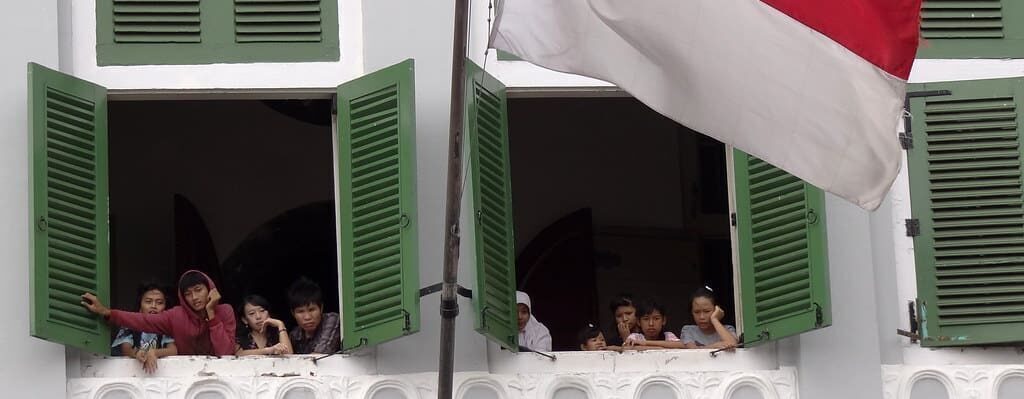
Indonesia has been particularly impacted by Covid-19. According to official data,[1] Indonesia ranks second within South East Asia in terms of positive cases ; fifth in terms of mortality rate. 20,5% of Covid-19 cases were located in the capital city, Jakarta. This blogpost focuses on the legal response adopted in the first phase of the pandemic, i.e. until Mid-June 2020, when regions started to ease “large-scale social restrictions” previously adopted to respond to the pandemic.
A hybrid – and confusing – institutional response to the Covid-19 crisis
After denying the presence of the Covid-19 pandemic within the archipelago, the Indonesian government contemplated triggering civil emergency, on the basis of the 1959 Emergency Law, which is rather aimed at responding to coups and other such events threatening the institutions. Following civil society and political opposition’s uproar, the government eventually adopted a more nuanced approach, and instead the president proclaimed health emergency,[2] based on the Health Quarantine Law No. 6/2018. Meanwhile, the National Agency for Disaster Management (Bahasa acronym BNBP) declared Covid-19 a natural disaster as of January 2020, and adopted a number of early measures to attempt containing the crisis.[3] On the basis of the Disaster Management Law 24/2007, the BNBP’s mandate usually applies to threats such as a tsunami, earthquakes and volcanic eruptions.
Against this background, President Jokowi adopted a hybrid legal approach, grounding the substantial measures on the Health Quarantine Law, while designating the BNBP as the coordinator of the national taskforce.[4] Yet, according to the former law, the responsibility to handle an epidemic falls back to the central government, namely the President and the Ministry of Health.
This is not only a legal challenge, but also a practical one, as institutional coordination is particularly challenging in Indonesia, in light of the number of entities involved both at the central and regional levels. In the Covid-19 context, each Ministry at the central level retained its policy prerogatives, which has led, at several occasions, to the enactment of conflicting regulations. For instance, the Health ministry decided on measures of social-distancing within the business sector,[5] which contradicted a regulation adopted by the Ministry of Industry.[6]
The lack of central coordination contributed to scattered approaches at the regional level, as the central Executive did not provide any guidance as to how to implement the measures it had enacted.[7] As a result, each region set a different deadline for easing health emergency measures. These decisions were based on the regional authorities’ own intuitive criteria, in the absence of any harmonised criteria related to the statute of the pandemic. The cacophony could also be observed at the central level, with the announcement late-May of restarting economic activities, at a time when the number of cases was still increasing.[8] In this regard, it has been observed that the government did not respect the WHO guidelines, as it did not include the death rate among the various statistics on which it grounded its decisions.[9]
A policy-induced vicious circle of vulnerability
The choice of policy was not neutral either. The Health Quarantine Law foresees a range of four distinct actions to address an epidemic: home quarantine; hospital quarantine; lockdown and large scale-social restrictions (LSSR). The three first ones are quite narrowly defined in terms of restrictions to the freedom of movement. Their implementation should go hand in hand with measures meant to address basic needs of those impacted, including their pets and livestock. In turn, the authorities have the mandate to assign sanctions to those who would not respect the measures.
Yet, the government decided to implement LSSR, which consists in measures such as temporary closure of schools, a number of public places and social distancing, rather than any of the three first options.
In practice, LSSR became a de facto lockdown,[10] as restrictions to move from one province to another were enforced through a range of sanctions – including warning, sealing, physical punishment and criminal sanctions – though not foreseen in the Health Quarantine Law. This raises the question of the legal basis for any such sanctions, which were predominantly deployed at the local level. For instance, the Jakarta Governor enacted some regulation which sanctioned the absence of wearing a mask with the obligation to clean public facilities,[11] a sanction which is completely foreign to criminal law and therefore in clear breach with the principle of legality, as stated at art. 1 of the Indonesian criminal code. The overall sanction regime, whether criminal or else, is also likely to Infringe the principle of legal certainty, enshrined in art. 28 D of the Indonesian Constitution. The police thus passed its own regulations, through internal notice[12] and telegram[13] to regulate this matter, which contributed to weaken the central government’s leadership amidst the crisis.
Furthermore, LSSR is a measure which, in in the Health Quarantine Law, does not require the fulfilment of basic needs. According to art. 28 C(1) of the Constitution, the fulfilment of Indonesians’ basic needs is a precondition to realise their right to individual development. In a country where informal economy is quite spread, the implementation of a strict lockdown policy without any forms of economic compensation or social support could not have any other effects than throwing millions of Indonesians into a deep social crisis, and infringing their human rights on many levels.
Both during the implementation of LSSR and afterwards, the Indonesian executive has overlooked small businesses and categories of population in situation of vulnerability. Social welfare is relatively limited in Indonesia and the post-Covid-19 recovery plan predominantly focus on private economic actors to handle economic loss.[14] In order to survive, these harsh measures led some to violate LSSR and in turn be sanctioned, so as to create a vicious circle of vulnerability.
Authors : Yunita and Elisa Novic
The authors would like to warmly thank LBH Jakarta and Laporcovid for for sharing their data and providing input.
[1] Last consulted on August 10th, 2020.
[2] Presidential Decree No. 11 of 2020 on the Stipulation of Coronavirus Disease 2019 (Covid-19).
[3] See i.a. BNPB decree No. 9A of 2020 concerning the determination of the status of certain emergencies of the disease epidemic due to COVID-19 (28 January 2020); BNPB decree No. 13A of 2020 regarding the extension of the status of certain emergencies from disease outbreaks due to corona virus in Indonesia (29 February 2020).
[4] Presidential Decree No 7 of 2020 concerning the acceleration of the coronavirus disease 2019 (Covid-19) handling, led by a task force steering council (13 March 2020), amended by Presidential decree No 9 of 2020 (20 March 2020).
[5] Health Ministry Regulation No 9 of 2020 providing guidance of LSSR in the context of Covid-19 (3 April 2020).
[6] Circular letter of Ministry of Industry No 4 of 2020 related to the operational implementation of COVID -19 health emergency in factories (7 April 2020), as amended by circular letter No 7 of 2020 (9 April 2020).
[7] Ridzki Putra Ramadhan, Indonesia and COVID-19: Government Issues Regulation on Limiting Social Interaction (2020).
[8] See Health Ministry Decision No. HK.01.07/MENKES/328/2020 (20 May 2020), followed by various local regulations. On 20 May 2020, there was a total of 19,189 cases, including 207 new cases on this single day.
[9] According to Laporcovid.org, a platform developed by committed citizens, Jakarta’s death rate amounted to 1505 persons, while official data would only count 361 persons (9 May 2020). See Covid-19 situation on Indonesia’s seven main islands in Indonesia.
[10] The government of Jakarta also enacted Regulation no. 47 of 2020 concerning the requirement of a permit letter to enter Jakarta. Yet, such a measure may only be implemented under a lockdown policy (which limits movements within the province).
[11] Jakarta Governor Regulation No. 41 of 2020 concerning sanctions against the implementation of LSSR in Covid-19 in Jakarta.
[12] Indonesian police notice No: 2/III/2020 relating the compliance against COVID-19 policy (19 March 2020)
[13] Telegram of Indonesian police relating LSSR No. ST/1098/IV/HUK.7.1/2020 that can criminalize people against the authority (4 April 2020), Telegram of Indonesian police relating cyber No. ST/1100/IV/HUK.7.1/2020 that gives sanction for combatting hoax and defamation to president/government (4 April 2020)
[14] Regulation in lieu of law (Bahasa acronym Perppu) No 1 of 2020. Furthermore, the regulation in lieu of law also mentioned that the government cannot be sued for any conduct in good faith mentioned by the regulation.



